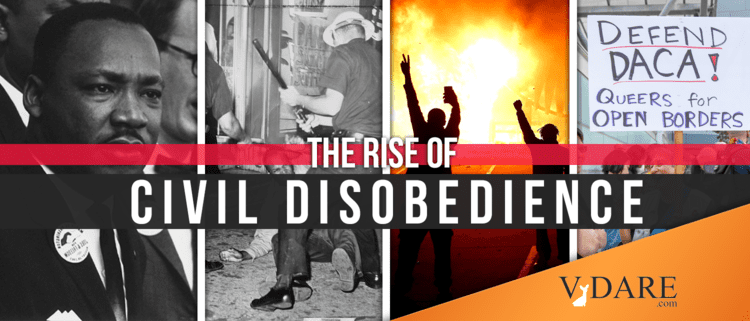


01/20/2020
On the holiday set aside in 2020 to honor Martin Luther King, the premier advocate of nonviolent Gandhian civil disobedience, thousands of gun owners gathered in Richmond to petition peacefully for their rights.
King had preached that there was a higher law that justified breaking existing laws that mandated racial segregation.
When Rosa Parks refused to give up her seat in the front of the bus in Montgomery, when Freedom Riders integrated bus terminals, when black students sat at segregated lunch counters in North Carolina, they challenged state law in the name of what they said was a higher law.
And Virginia gun owners believe their moral obligation to protect families, friends and themselves in a violent society justifies their right to keep and carry firearms, no matter what the Virginia legislature says.
Americans have a long history of breaching laws in the name of a higher law or God-given rights.
The patriots of Boston gathered an arsenal at Concord in defiance of the British. To protest a tea tax imposed by parliament, they dressed as American Indians and threw shiploads of imported tea into Boston Harbor.
Shays' Rebellion in Massachusetts, to protest debt collections in 1786-87, and the 1794 Whiskey Rebellion in western Pennsylvania, to protest a tax, both had to be crushed with force.
Abolitionists supported the violation of fugitive slave laws, the enforcement of which Lincoln endorsed in his first inaugural as a national necessity to restore and preserve the Union.
A constitutional prohibition of the sale of beer, wine and liquor in the U.S., following the enactment of the 18th Amendment, led to massive civil disobedience in the Roaring '20s, before it was repealed in 1933 by the 21st Amendment.
During Vietnam, burning draft cards was a regular feature of anti-war rallies.
Historians may describe the racial riots of the 1960s — Harlem, Watts, Newark, Detroit, and 100 U.S. cities including Washington, D.C., after King’s assassination — as popular uprisings, but many required National Guard and federal troops to stop the looting, shooting and arson.
By the late 1960s, LBJ, who had passed the Civil Rights Act of 1964 and the Voting Rights Act of 1965, could not visit a college campus without a violent demonstration.
This week, Washington hosts the 46th annual March for Life to commemorate the 60 million unborn killed in the abortion mills of America since Roe v. Wade in 1973.
In conservative states, restrictions imposed on abortion facilities have put some out of business. The legislators and governors who have done so believe the right to life trumps the Warren Court ruling in Roe v. Wade.
Perhaps the greatest manifestation of civil disobedience today is the illegal presence of between 12 million and 20 million immigrants who broke into our country or are breaking the law by being here after their visas expired.
Their collaborators are the business owners who hire them and the public officials who refuse to treat them as lawbreakers.
"Sanctuary cities" have been created where local and state authorities refuse to cooperate with immigration enforcement.
Now, towns, cities and counties are creating "Second Amendment sanctuaries," where laws restricting gun rights will not be enforced.
If state and local police, themselves gun owners, stand with those who defy the new state laws on guns, who enforces the new laws?
The Virginia Senate has begun to move bills requiring background checks for gun purchasers including red flag laws to disarm individuals deemed at risk to themselves or others, and bills granting permission for locales to restrict the carrying of arms in government buildings and confining the purchases of handguns to one a month.
There are other restrictions the Democratic legislature in Richmond and governor are ready to move, including restricting the number of bullets in clips and magazines and halting sales of rifles like the AR-15.
Gun owners see these as the onset of an all-out assault on gun rights.
For a republic to endure, there has to be a common consent on the rule of law and what constitutes a good society. But these seem to be at issue again in America.
Is abortion the killing of an innocent human being? Do Americans have a constitutional and human right to keep and carry firearms to protect themselves and their loved ones?
Who is and who is not a rightful resident of our national home?
Do illegal migrants have a right to come here and stay here? Or do their numbers imperil our national identity and existence as "one nation and one people"?
Violent crime was greater in America in the early 1990s. Urban riots were far more common in the 1960s. And there is nothing today comparable to the bloodletting of the 1861-65 War Between the States.
Still, Americans seem to disagree with each other more and to dislike each other more than they have in the lifetime of most of us.
One wonders: How does it all stay together? And for how long?

COPYRIGHT 2019 CREATORS.COM
Patrick J. Buchanan needs no introduction to VDARE.com readers; his books State of Emergency: The Third World Invasion and Conquest of America, and Suicide of a Superpower: Will America Survive to 2025? are available from Amazon.com. Patrick J. Buchanan is the author of “The Greatest Comeback: How Richard Nixon Rose From Defeat to Create the New Majority.
His latest book, published May, 2018, is “Nixon’s White House Wars: The Battles That Made and Broke a President and Divided America Forever.”
See Peter Brimelow’s review: “Wheel And Fight” — Pat Buchanan’s Nixon Book Provides Road Map For Trump.